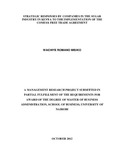| dc.description.abstract | The purpose of this study was to establish the strategic responses by the sugar companies in Kenya to deal with the environmental challenge posed by the imminent full
implementation of the COMESA FTA protocol and which will mean that there will be
unlimited importation of cheaper sugar from COMESA member countries.
The research problem was solved through the use of a cross-sectional descriptive survey.
A descriptive survey normally attempts to describe or define a subject by creating a
profile of a group of problems, people or events, through the collection of data and
tabulation of the frequencies or their interaction. The target population of this study was
all the 11 sugar companies licensed by the Kenya Sugar Board as at March 2012.
The findings indicate that the major challenges were the high cost of farm inputs, the
uneconomical size of farmers plots, the weak management of farmers institutions and
lack of diversification. The findings also indicate that only 43% of the respondents had
strategic responses to the environmental threat. The majority (57%) implied that they had
not developed any strategic responses. The findings further indicate that the majority
(67%) of those who have put in place strategic responses believe that these responses
were adequate. The study established that increasing marketing activities was ranked
highest as a strategic response same as leadership strategy. The next highly ranked
strategic response was increased use of ICT and lastly, culture change.
The following recommendations can be made from the study. First of all, sugar
companies should come up with appropriate strategic responses to the external threat
posed by the upcoming full implementation of the COMESA FTA. Secondly, from the
study, it appears that the strategic responses ranked highest are not those that immediately address the reasons why locally produced sugar is uncompetitive locally and regionally.
Therefore it is highly recommended that the respective companies come up with
appropriate strategic responses to address the issue of high costs of production that leads to the uncompetitiveness of the locally produced sugar. | en |

